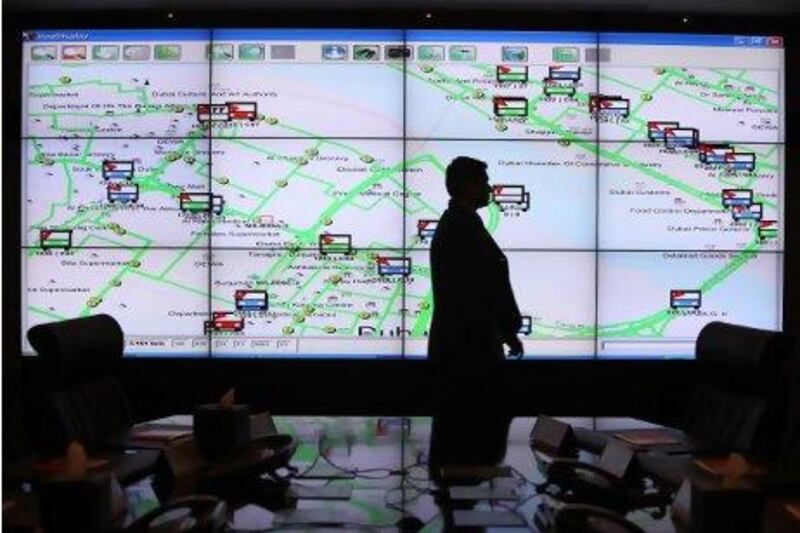DUBAI // When Ahmed Hashem Bahrozyan has an easy day at the office, chances are your commute to and from work went smoothly.
Mr Bahrozyan is the chief executive of the Road and Transport Authority's licensing agency and commander of its Crisis Management Team (CMT) in Dubai.
"The RTA has invested billions of dirhams over the past few years on building and maintaining a transport infrastructure," said Mr Bahrozyan. "The job of the CMT is to support those agencies, protect their assets and ensure continuity of service."
"If there is a breakdown we have to restore it as soon as possible. The issue first goes to the Emergency Management Team. If they are unable to clear it in time it is then escalated to a crisis and CMT is alerted."
The CMT is on-call 24 hours a day, seven days a week. Mr Bahrozyan's phone is always receiving information on incidents throughout the transport infrastructure.
"Every member of the CMT must assemble at the Crisis Operations Centre within 30 minutes of the dispatch. The first hour of the incident is called the 'Golden Hour.' Our best option is to try to resolve the situation within that time to reduce its impact on other parts of the infrastructure."
The new Crisis Operations Centre is high-tech hub filled with giant screens. The screens broadcast streams from more than 5,000 cameras fitted to the Dubai Metro coaches and stations, various streets across the emirate, marine transit points, and other RTA facilities.
The centre is fully operational only during a crisis, but there are staff on hand to ensure all components of the centre are operational in case an incident should occur.
Ahmad Ali Ahmad is the crisis operations engineer and chief supervisor of the new centre. His job is to monitor emergencies and call in the Crisis Management Team when things go bad.
"We have an alert system that allows us to quickly send out SMSes to the various RTA teams informing them of any incidents," he said.
The RTA has four operations centres: one each for taxis, buses, the Metro and Marine. Crisis Operations Centre is linked to their systems and receives real-time information about any problems.
"The crisis centre has also been fitted with hotlines to various government departments such as the Dubai Police, Dewa, Dubai Municipality, the National Emergency Crisis and Disaster Management Authority, Civil Defence, and the ambulance services," said Mr Bahrozyan.
The various bodies run regular drills to ensure they are prepared to work together in any situation. And to be doubly sure, the RTA's new Accident Investigation Centre (AIC) – next door to the crisis centre – has been running simulations of every imaginable scenario.
The AIC was launched this month with the aim of not only providing detailed information during accident investigations, but also to run safety and risk assessments. For example, the centre created a 3-D simulation of a train derailment on the Dubai Metro.
"These scenarios provide our team with invaluable experience in how to handle extraordinary situations in a controlled environment, so should they ever be in that situation they will be respond quickly and efficiently," said Shihab Ahmad Maki, an accident investigation engineer at AIC.
In the event of a real accident, the AIC analyses all collected evidence from an accident site and provides a detailed report to the investigation team.
"We enter all the data collected by the investigators into our system and run a forensic analysis to determine the specifics of the accident," said Mr Maki. "Once we have concluded a report we also create a 3-D model of the incident which we can use for training or assessment.
"We also provide recommendations to the RTA and try to prevent future incidents. These recommendation can range from a need for new equipment, to specification changes or a complete redesign of a system."
While both centres are poised to spring into full action during a crisis, the real hope is that they never do.
"In 2012 we had many emergency situations, but I'm happy to say that none of them were escalated crisis," said Mr Bahrozyan.
"This shows how efficient the EMT is and how good they are at handling emergency situations."
malkhan@thenational.ae






